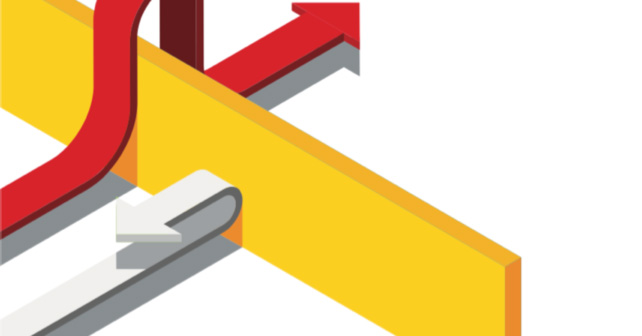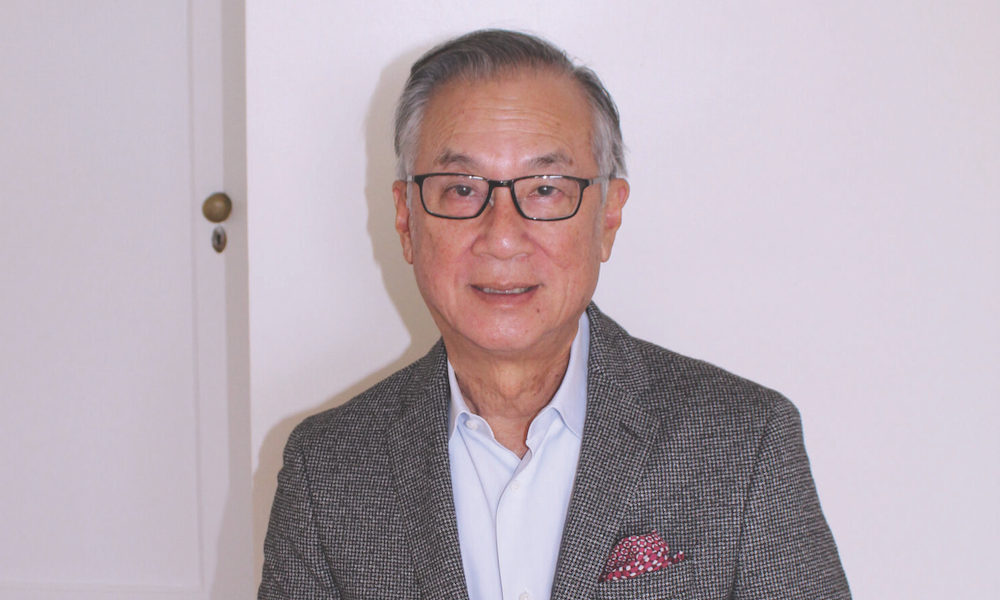Maarten Asser defines adaptive leadership for a borderless world.
For more than a decade, we’ve wondered, can leaders be successful outside the context of their national cultures?Societies differ fundamentally. For example, some emphasize the collective, like Japan, while others celebrate the individual, like Australia. With societies differing significantly in how residents are nurtured, is it possible to adapt to new leadership norms without losing a sense of self? Can you be successful abroad and remain authentic and true to your core beliefs and values?
At Intercultural Business Improvement (IBI), we have worked alongside thousands of managers, and assessed leaders who work across boundaries on two critical abilities. The first is the ability to integrate differences; the second, the ability to bridge the divide across national cultures – in essence, to leverage differences. We came to realize that the most successful leaders’ underlying ‘living’ logic, their mindset, and their analytical thought process are based on duality rather than singularity. In other words, they enjoy working with true tensions between seemingly opposed values and opinions, whereas traditional leaders try to avoid or ignore these conflicts. These successful leaders have a fundamental skill – they are adaptable. Truly adaptive leaders are inter-culturally competent: they can value each culture in its context, and still create organizational and/or team value from the diversity of seemingly opposed cultural norms and values.
The facets of adaptability
We created a questionnaire, the Intercultural Readiness Check (IRC), to help us distinguish between high- and low-potential integrators of seemingly opposed dualities. We now have a database of over 50,000 senior leaders in business, politics and academia from around the world. From this practical research and a large literature study, we concluded that adaptability can be assessed on the basis of four separate competencies: sensitivity, communication style, ability to build commitment, and managing uncertainty. Each measures a leader’s effectiveness in working across opposed value propositions. A score is created for each competency and they are broken down into cognitive and action-oriented facets, reflecting the importance of both thinking and doing.
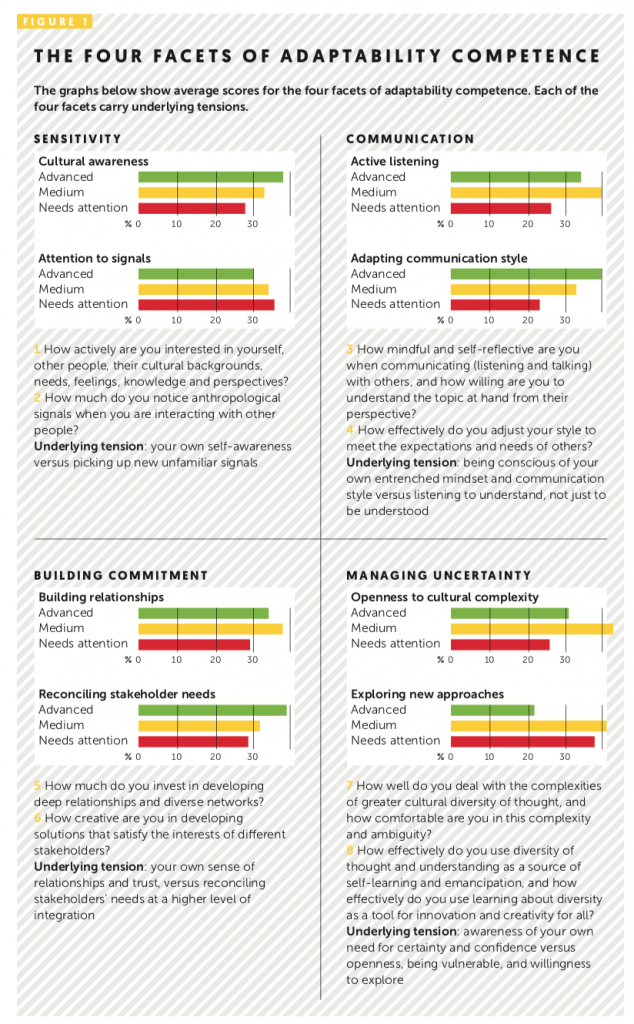
Figure 1 shows average scores across the entire dataset. Although the percentages of ‘advanced’ scores look reasonable, the combined ‘medium’ and ‘needs attention’ scores indicate that, across all eight facets of the competencies, widespread improvements are needed for organizations and leaders to become truly adaptive across boundaries.
What is leadership adaptability?
What we learned from our database is that the more adaptable leaders are, the more inclusive and effective they are across any kind of boundaries, including different cultures.
In terms of sensitivity, the most adaptable leaders are those who are exceptionally self- and culturally-aware, and are curious about picking up new signals from others. They make no assumptions about other’s habits and thought processes, as they don’t imagine them being the same as their own.
The best communicators are those highly aware of their own communication style. They are able to adjust their style, verbal and non-verbal, to the needs of those they communicate with and whom they wish to understand.
The best commitment builders are leaders who take time to develop deep, long-lasting relationships. They work tirelessly to satisfy individual stakeholder needs while reconciling all stakeholder needs, including their own.
Those who best manage uncertainty are aware of the complexity of life and don’t attempt to simplify it. They empathetically and consciously embrace the challenges of uncertainty by remaining open to changing their own minds. They admit fallibility and vulnerability, and actively explore and support others’ viewpoints for the benefit of all involved.
Leadership adaptability in action
The critical importance of leadership adaptability was evident in a fascinating encounter I witnessed in Rwanda in March 2018. It was the first meeting between a native Rwandan neurologist, Dr Fidèle Sebara – who had been sponsored and educated by the mid-sized pharma company that brought IBI to Rwanda – and Innocent, the leader of a 500-strong group of local medicine men. These traditional healers practise medicine in rural villages, drawing on knowledge passed down through generations. Rwandan health clinics can be several days’ walking distance from villages, so locals rely on the traditional healers to cure both simple and serious ailments.
We aimed to find a solution for a growing problem. After the 1994 genocide in Rwanda, many female patients complained about seizures, with symptoms akin to those of epilepsy patients. Traditional healers did not treat these women on the basis of the latest neurological science. We wanted to change that.
Meeting for the first time, both the neurologist and the traditional healer had to overcome the fear of what the other might do to their identity and stature in their respective communities. Both men had found many reasons to postpone earlier attempts to meet.
The meeting had been brokered by Dr Dirk Teuwen, vice-president of corporate societal sustainability for the pharma company, himself an established Western-educated medical doctor with decades of experience working with local governments across the African continent, as well as in rural China. Aware of his own status as a mediating outsider with some influence, Teuwen managed to lead the two men to a mutually beneficial commitment by creating and holding the space, guiding the conversation through humble presence – he didn’t speak Kinyarwanda, the local language – and tone of voice, empathy, and mutual respect. Such meetings are not negotiations, and if the first meeting had been unsuccessful, it is unlikely that there would have been another.
Teuwen’s ability to be adaptable – both flexible and firm, creative and consistent, goal- as well as relationship-oriented – provided the context within which the two Rwandan men found a way to collaborate. The event quickly became famous among local medicine men and the medical community: in its wake, hundreds of traditional healers met Sebara in workshops, learning how they could better diagnose the neurological disorders that many patients suffered after the genocide. Literally thousands of potential neurological patients in Rwanda stand to benefit from this collaboration.
Core strength and flexibility
Successful adaptable leadership means a new way of leading and navigating between two compelling, positively framed, and desirable value propositions. The traditional, competitive, ‘either/or’ approach isn’t very effective when it comes to reconciling widely differing value orientations. As an individual, you need a strong and consistent core and at the same time, you need to be flexible and adaptable at the boundaries, in order to provide clarity and fairness, confidence and shelter and create value for multiple stakeholders. A good metaphor is the willow tree. It has a wide network of roots extending well beyond its branches. The tree’s core – its trunk – is strong, tight and consistent, but its roots and branches are flexible and adaptable, able to sway in the storm while staying intact.
In the same way, the adaptive leader requires a strong core, great self-control and self-awareness in order to stand strong, while remaining open to movement and being able to reach for new relationships, connections, learning, understanding and insight.
The value of adaptability
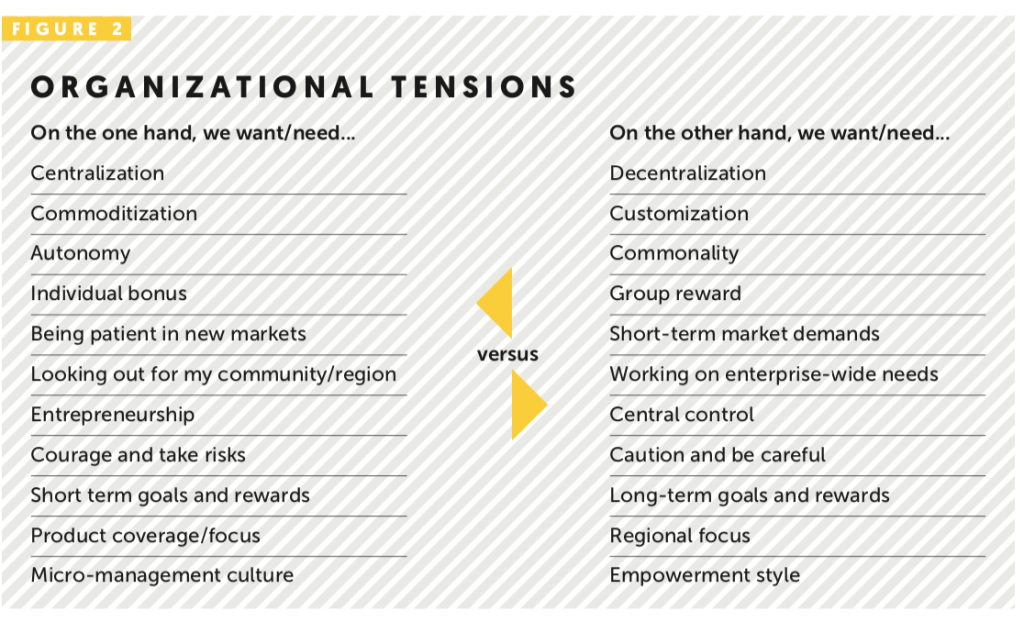 Most organizations consist of tensions: long-term strategy and short-term results, autonomy and collaboration, individual and team rewards, as Figure 2 illustrates. Leaders need to positively (re)frame the underlying value propositions and make both sides desirable, before entering a process of reconciliation and integration to get the best of both worlds. Adaptive leaders have the potential to be very innovative, as the most interesting innovations are true integrations of cross-disciplinary tensions: it is why they are scarce, and potentially very profitable.
Most organizations consist of tensions: long-term strategy and short-term results, autonomy and collaboration, individual and team rewards, as Figure 2 illustrates. Leaders need to positively (re)frame the underlying value propositions and make both sides desirable, before entering a process of reconciliation and integration to get the best of both worlds. Adaptive leaders have the potential to be very innovative, as the most interesting innovations are true integrations of cross-disciplinary tensions: it is why they are scarce, and potentially very profitable.
In a world where business spans borders and boundaries, leaders need to ask questions of themselves and their environment. It is always possible to change your current logic, mindset, and conversations; to increase your adaptability. But it means honestly answering some tough questions. How inclusive a person are you? How receptive are you to different people and their science, knowledge and insights? How much time do you give people? What is your immutable core? Can you integrate new and different perspectives without feeling threatened?
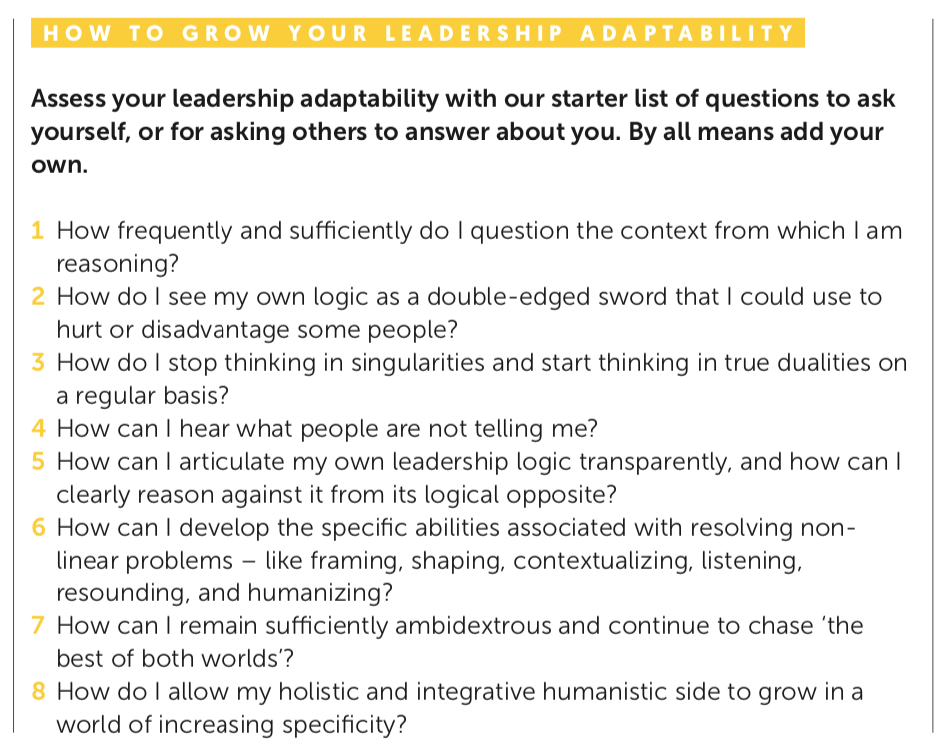
Answering those questions can help you to understand others, be clearer in your intentions, and come out with decisions that are better supported by those in your organizations and communities. That is the true value of adaptability. The logic of duality isn’t hard to master, as long as we focus on positively-framed and desirable opposite value propositions, and stop pitching one value against another. Such either/or thinking means putting leaders at odds with each other in divided organizations, in an already too-fragmented world.
— Maarten Asser is an executive development faculty member of Duke Corporate Education, a leadership immersion designer, a global leadership expert and an executive team coach. An adapted version of this article appeared on the Dialogue Review website.
